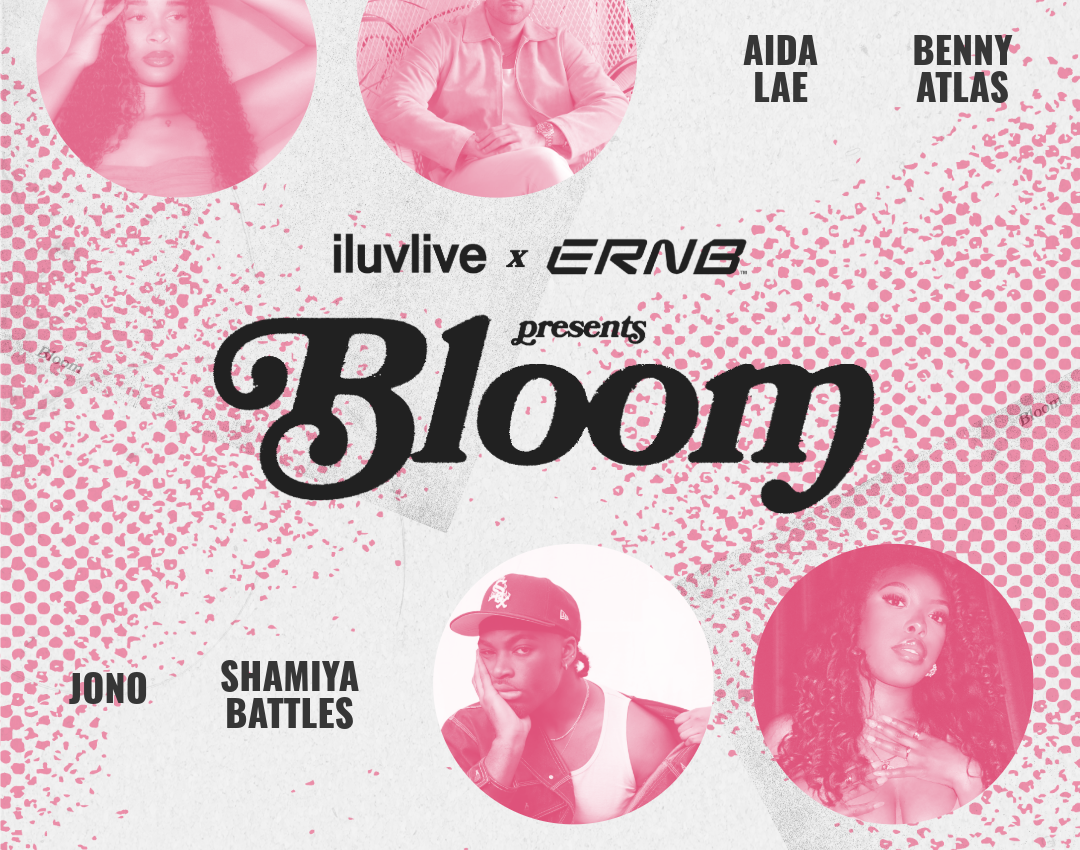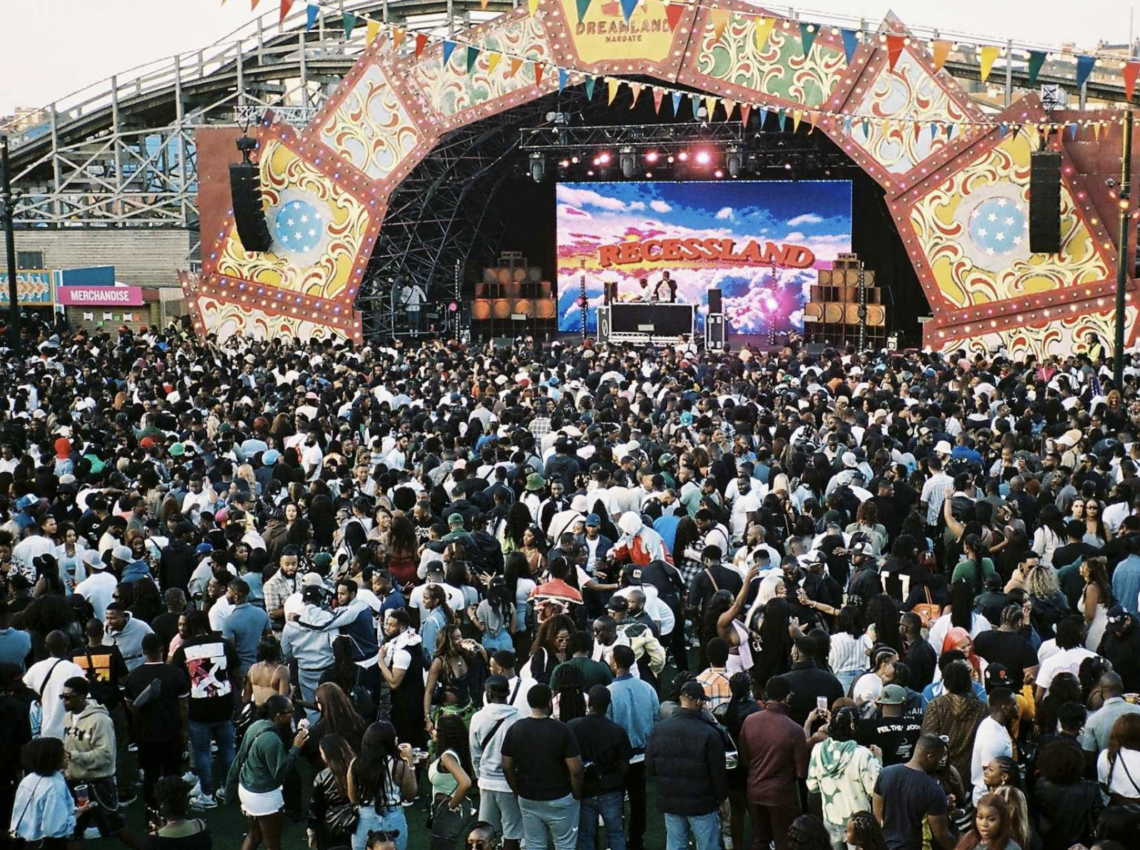Bullying and Harassment Survey in the Music Industry, YourSafetyYourSay
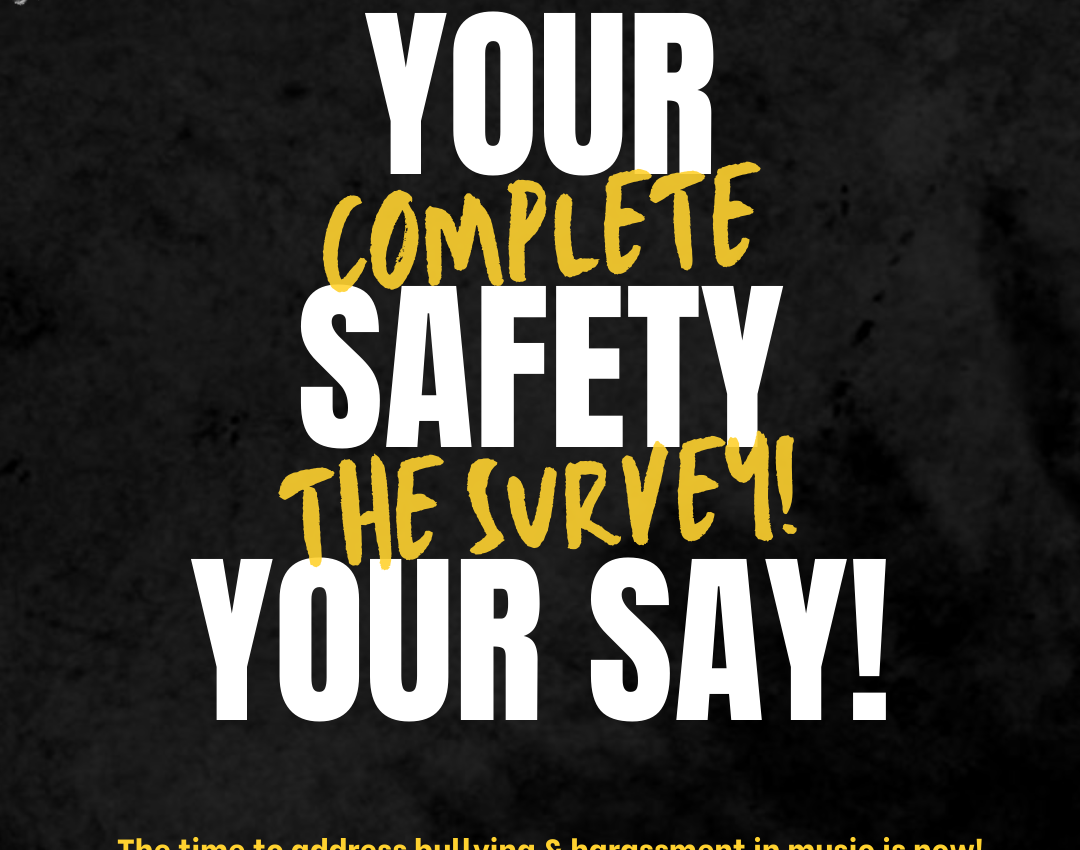
Calling for music professionals across the UK to take part in ground-breaking research to eradicate Bullying & Harassment from the UK Music Industry
Black Lives In Music (BLiM), the organisation set up to address racial inequality in the music industry and create opportunities for Black, Asian and ethnically diverse musicians and professionals, are today launching their YourSafetyYourSay survey on Bullying and Harassment in the music industry.
After becoming aware of shocking abuse, BLiM will use the anonymous survey to collect real world data. This will inform legislation and the work of the new Creative Industries Independent Standards Authority (CIISA) and the wider music industry. It will also be used to support BLiM’s forthcoming Anti Racist Code of Conduct and reporting tool, which will work towards eradicating discrimination, bullying and harassment throughout the music ecosystem.
Fill in the survey HERE, which needs to be completed in full.
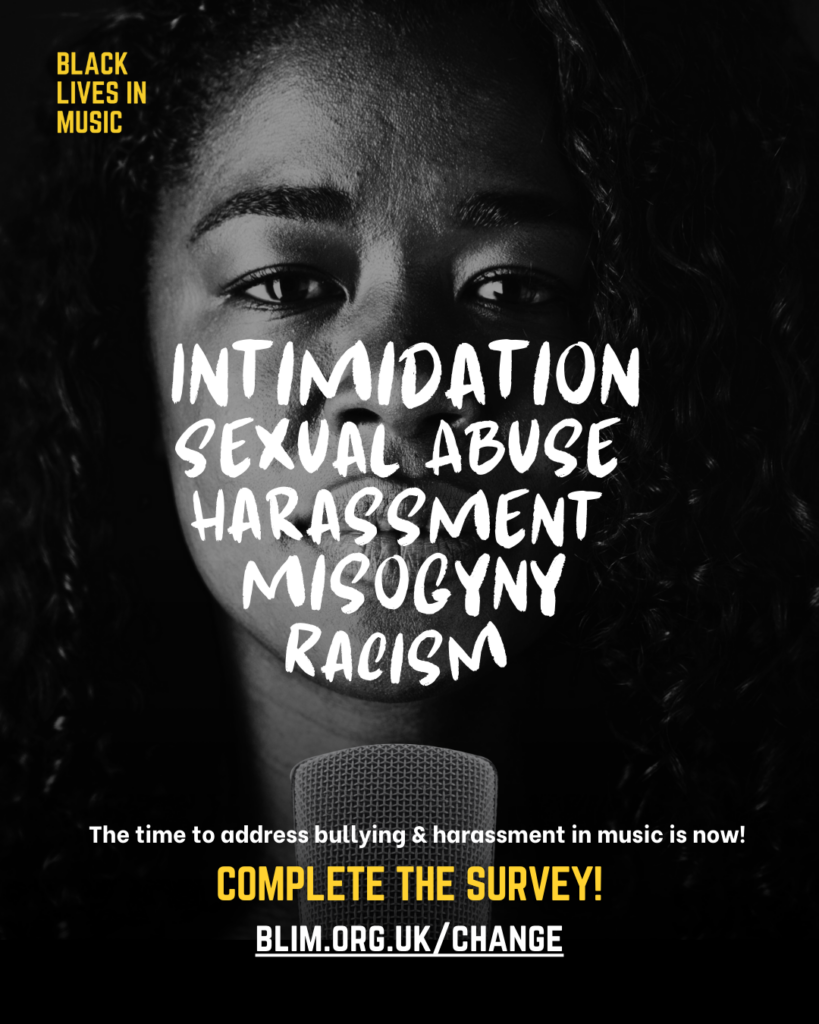
The Department of Culture, Media and Sport (DCMS) has also requested the data to inform their work in this area.
Since publishing their ‘Being Black in the Music Industry’ report in 2021, BLiM has been inundated with calls for help from creatives in the music industry who have experienced bullying and harassment. Testimonies gathered so far range from women being pressured to wear shorter skirts at events, allegations of rape and sexual assault in music studios, racial and sexual comments about appearance and being pressured to drink alcohol before being assaulted, all of which are reminiscent of the gruelling accounts of the #MeToo movement.
Their evidence informed the recent findings of the Misogyny In Music Inquiry in Parliament, which found the UK music industry to be a “boys’ club” where sexual harassment and abuse is common, and the non-reporting of such incidents is high. “Victims who do speak out struggle to be believed, or may find their career ends as a consequence.”
Singer-songwriter V V Brown supports the YourSafetyYourSay survey and has shared some of her experiences of bullying and harassment in the workplace, “The YourSafetyYourSay survey, is needed to help eradicate discrimination, bullying and harassment in the music industry, especially towards Black and POC individuals, and to have somewhere to report these incidents. This is such important work, and I fully support Black Lives In Music’s valiant work, and urge those comfortable to share their stories.
As a black woman, I often felt silenced and excluded, labelled as aggressive or aloof. Bullying ranged from isolation to daily emails with derogatory language. Even in high-profile fashion settings, I felt marginalised, as if I didn’t belong. I faced a barrage of racist comments online…enduring over a million comments, leaving me feeling deeply unsafe. The most hurtful bullying I experienced came from left-wing liberals who professed to support equality but hindered black individuals’ opportunities. One of the most painful incidents was when a prominent DJ on national radio mocked my appearance with a caller. I cried for days…even though it marked my first radio play.
The expectation to internalise and tolerate [bullying in the workplace] was pervasive. There was a constant fear that expressing my pain would lead to being labelled as overly sensitive or even being blamed as the aggressor.”
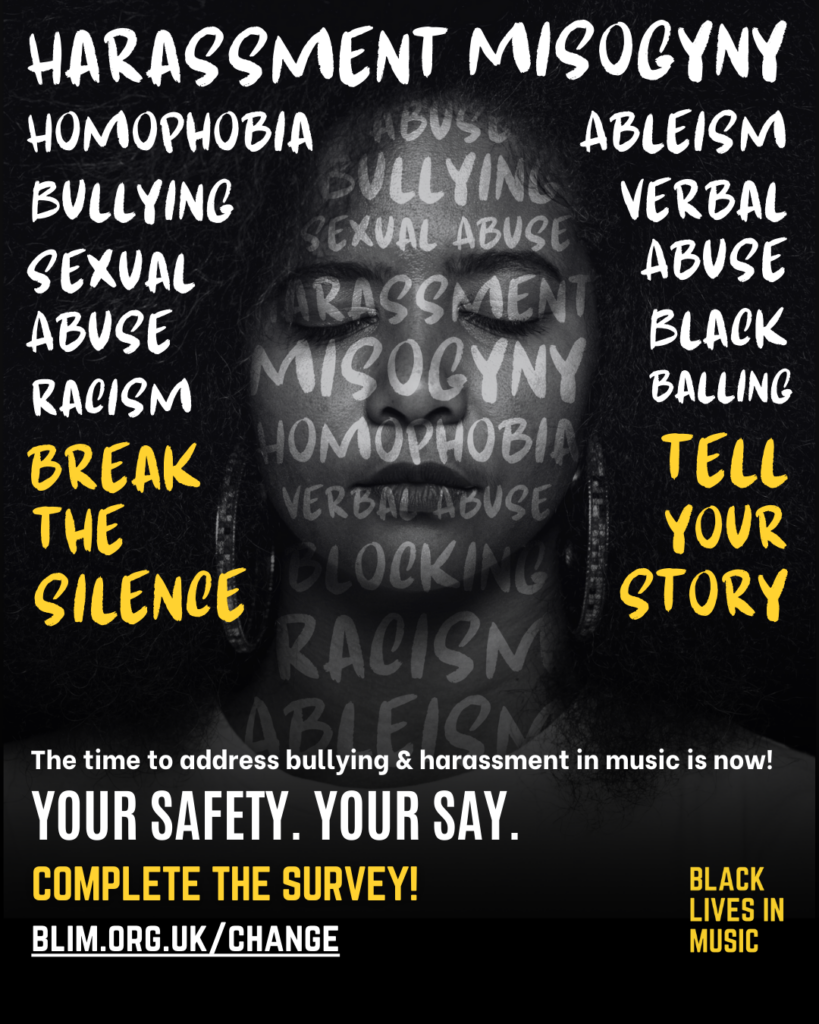
Alternative rock duo Nova Twins also express their support for the survey, sharing their experiences, “We have to acknowledge the barriers faced by POC talent within the music industry. Far too often, Black musicians and industry professionals encounter bullying and harassment, stifling their voices and existence. Discriminatory labels limit our creativity and opportunities, hindering our ability to thrive. Hearing from other artists like us with very similar experiences, both independent and on majors, has been eye-opening. These hurdles, and plenty more like them, could’ve easily held us back from reaching our full potential. It’s a story too many of us share. That’s why the YourSafetyYourSay survey is a vital step towards amplifying marginalised voices, uncovering untold stories that need to be heard.
We were often told that Black women shouldn’t make the music we were making because there was supposedly no market for it. We’d be pushed to fit into stereotypes, saying we should go more Hip Hop or RnB. It wasn’t just the labels; even Punk/Riot Grrrl publications excluded us from event coverage, which felt telling considering we were often the only POC artists on the bill. Our music and performance styles were labelled as too intense or aggressive. Yet, the same energy from white male counterparts would be praised as ‘rock and roll.’ At shows, our position as musicians was frequently undermined, with people post show assuming we were backup dancers, rather than the Rock act just performing on stage.”
Grammy-winning artist Kamille adds, “From the beginning of my journey in the music industry, I’ve faced so many barriers… I realised very early on that we (black women in music) are labelled negatively when we defend ourselves against bullying. We’re often judged beyond our talents, and even sometimes exploited in ways that can gaslight us into accepting harassment online via social media, in the form constructive criticism. But it’s not ok, and I think it’s important to speak up against bullying in any form. I really want to use my platform to promote a safe supportive space for all types of black artists.”
YourSafetyYourSay has strong backing from Pirate Studios, who have an equally clear vision of a safer music industry for all. Co-founder and CEO, David Borrie, says: “I want to express my full support for BLiM’s initiative to address the shocking findings of bullying and harassment in our industry. Music studios should be a safe and inclusive environment for all artists – a space where creativity and self-expression can thrive. We invite and encourage our community of over 400k grassroots artists to participate in the YourSafetyYourSay survey, helping us better understand the experience of marginalised voices, and most importantly, how issues of bullying, harassment and discrimination can be eradicated from our industry.”
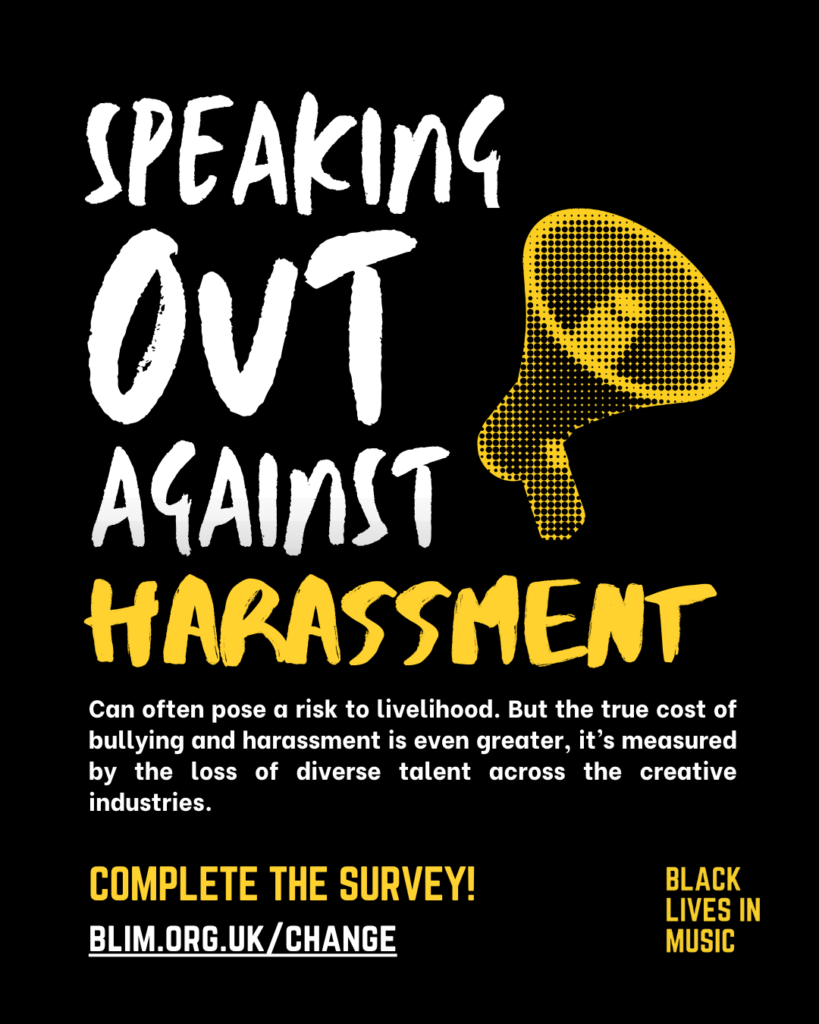
The survey is also supported by The Ivors Academy.
Chief Executive of BLiM, Charisse Beaumont says, “We are flooded with stories from people who have experienced bullying and (sexual) harassment in the music industry. They are shocking and it’s clear that high profile cases in the media are the tip of an iceberg. It can happen to anyone and it is often rooted in misogyny, racism, homophobia, transphobia and more.
Bullying and harassment is normalised in the music industry, as shown by the Misogyny In Music Inquiry. To turn the Inquiry findings into action, we need the information. The data, especially from underrepresented groups, just doesn’t exist. The Bullying and Harassment survey will be a comprehensive survey to capture everyone’s voices, especially those rarely heard. We need to understand what is really going on behind closed doors so we can tailor interventions.”
“It’s time to double up our efforts against bullying, (sexual) harassment and discrimination. Black Lives in Music is fighting to ensure equality is standard in the music industry. Together, we can create a safe music industry where everyone thrives.”
In the past year, multiple stories of bullying and/or harassment in the music industry have surfaced in the media, highlighting the need for action.
BLiM know these are only the most well known examples – the organisation receives dozens of calls from people of all backgrounds who are experiencing bullying and harassment in the UK music industry. BLiM needs these stories to fight back, eradicate this behaviour and bring in legislation to protect the victims.
Black Lives in Music gave evidence at the Women and Equalities select committee’s Misogyny In Music Inquiry, and working with their partners, have identified a need for the YourSafetyYourSay Survey:
● The survey is for all people in all groups, in particular more data is needed around race/ethnicity, disability, sexuality and gender protected groups
● Bullying and Harassment is abuse of power and can be rooted in prejudices such as Misogyny, Racism, Homophobia and more and BLiM would like to bring a voice to this
● The research is being led by researcher and data analyst, Sania Haq – Bye2Stereotypes.com. BLiM have also partnered with Opinium Research who will analyse the data and assist in writing the report
● In the development of this research, BLiM has worked with researchers, psychotherapists, gender activists, the BLiM Taskforce and a number of additional key stakeholders.
Dame Heather Rabbatts, Chair, Time’s Up UK:
“Time’s Up UK is proud to support Black Lives in Music and the Bullying and Harassment campaign against bullying and harassment which launches with an important survey calling for musicians and music creators across the UK to share their experiences. This ground-breaking research marks the start of an essential journey to stamp out bullying and harassment in the UK music Industry. Please do spread the word.”
Jen Smith, Interim CEO, CIISA:
“We have been working hard to develop an independent standards authority with colleagues across film, TV, theatre and music to help prevent and tackle bullying and harassment in the creative industries, a Creative Industries Independent Standards Authority, which we are calling CIISA. This anonymous survey for people working in the music industry from Black Lives in Music will provide critical real world data, to inform legislation and our work with CIISA and we call on all who work in the music industry to share the survey as widely as possible and take part.”
Tom Kiehl, Interim Chief Executive, UK Music:
“The music industry needs to be a safe, welcoming and creative place to work – away from fear of harassment, bullying and discrimination. Sadly this is not always everyone’s experience. We need a better understanding as to why this is the case and the results of the Bullying and Harassment survey will be crucial in that regard. We must foster an environment within our sector where people can raise complaints without fear of recrimination or any adverse impact on their careers.”
For media information and enquiries:
The Outside Organisation
chris@outsideorganisation.com
milo@outsideorganisation.com
caitlin@outsideorganisation.com




![ZINO VINCI’S ‘FILTHY & DISGUSTING’EP BRINGS YOU TO THE CORE OF THE ARTIST [@ZinoVinci]](https://guap.co/wp-content/uploads/2023/10/Zino-4.jpg)

